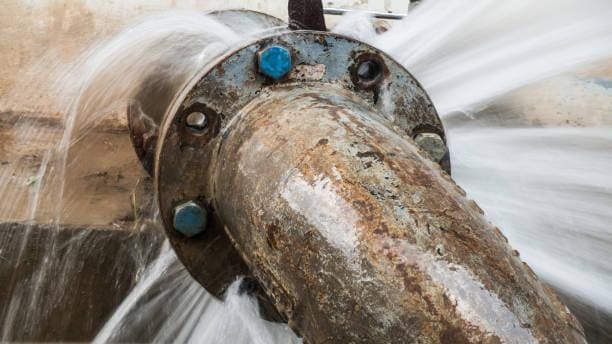Identifying the signs of a water main break early can help prevent significant property damage and disruptions in your daily routine. One of the most apparent signs of a water main break is a sudden and unexplained drop in water pressure throughout your home. This might be noticed when the flow from taps becomes unusually weak or when appliances that require water, such as dishwashers or washing machines, don’t operate effectively. Additionally, if the water coming from your taps appears discolored—often taking on a brown or yellow hue.
Outside the home, keep an eye out for unexplained wet or soggy areas in your yard or on public pavements near your property, which could suggest water seeping from a ruptured main. In colder climates, the presence of sudden, unexplained patches of ice on roadways or sidewalks could also indicate a water main break underneath. An unexpected increase in your water bill, despite no change in your household water usage, can also be a hint of a hidden leak stemming from a compromised water main.
Identifying a Water Main Break
Water main breaks can be disruptive and costly, so being able to quickly identify one is crucial for minimizing damage and restoring normal service. Here are the key signs that may indicate a water main break:
Sudden Drop in Water Pressure
A noticeable decrease in water pressure is one of the most immediate signs of a water main break. If you experience a significant reduction in water flow across multiple fixtures in your home, such as sinks, showers, and toilets, it might suggest that the water main supplying your house has been compromised. This drop in pressure can affect not just your home but potentially several residences in your area.
Discolored Water
When a water main breaks, sediments and rust that have accumulated inside the pipe can be dislodged, causing the water coming out of your taps to appear brown, yellow, or reddish. This discoloration is a strong indicator of disturbances within the water supply system. It’s advisable to avoid using discolored water for drinking or cooking until the issue is resolved and the water runs clear again.
Unusual Noises
Unexplained sounds such as bubbling, whistling, or banging from the plumbing system can indicate a problem. These noises may stem from the water trying to escape through cracks or breaks in the main line. Listening for these sounds, particularly in areas of your home where pipes are accessible or in basements, can help in early detection of a potential break.
Wet Spots and Sinkholes
If you notice unexplained wet spots, soggy patches in your yard, or pooling water on the road or pavement, this could be a direct result of water leaking from a broken main. In severe cases, the continuous leakage can wash away the soil underneath, leading to sinkholes or visible shifts in the ground, which pose serious safety risks.
Increased Water Bills
An unexplained increase in your water bill can often be the first hint of an undetected leak, possibly from a water main break. If your water usage habits haven’t changed but your bill has spiked, this could indicate water loss somewhere between the municipal supply and your home.
External and Financial Indicators
Identifying a water main break often requires paying attention to both the obvious physical signs and subtler financial indicators. Here’s a closer look at some external and financial clues that might suggest a water main break:
Visible Changes in the Environment
One of the most tangible signs of a water main break is changes to the environment around your property. Unexplained wet areas, puddles, or soggy patches in your yard that suddenly appear without recent rainfall can indicate water leaking from a nearby main. Similarly, during colder months, inexplicable patches of ice on roadways or sidewalks might suggest that water from a ruptured main is surfacing and freezing, posing a risk to pedestrians and vehicles.
Soil Displacement and Pavement Cracks
Significant leaks from a water main can lead to soil displacement as water washes away the ground supporting the surface. This can manifest as visible sinkholes or depressions in the ground near the suspected break. Additionally, if you observe new cracks in the pavement or unexplained shifts in the ground, these could be the results of underground water movement altering the landscape.
Noise from Underground
Sometimes, a water main break can produce audible clues before any visual signs become apparent. Sounds like rumbling, hissing, or clanging from beneath the ground can indicate water escaping under pressure. These noises might be more noticeable at night when ambient noise levels are lower.
Sudden Increase in Water Bills
An unexplained increase in your water bill is a significant financial indicator of a possible water main break. If your water usage patterns haven’t changed but your bill reflects higher usage, it might mean that water is being lost somewhere in the system. This is often one of the first signs that prompts homeowners to investigate for possible leaks.
Water Pressure Fluctuations in the Community
Keeping track of water pressure issues not just in your home but across your neighborhood can also provide hints of a larger, communal problem. If multiple homes in the area report similar decreases in water pressure or water quality issues, it suggests a more extensive issue with the local water main rather than individual household plumbing.
Observations from Municipal Water Reports
Staying informed about any maintenance, reported leaks, or repairs in your local water distribution system through municipal reports or community bulletins can offer preemptive clues about potential or impending issues affecting your area. Municipalities often issue warnings or updates about work on water mains that could preemptively inform you about potential disruptions.
Professional vs. DIY Maintenance
While homeowners can perform basic plumbing maintenance tasks such as checking for leaks under sinks or clearing minor clogs with a plunger, more complex issues like pipe corrosion, sewer backups, or significant leak repairs require professional expertise. At 24/7 Plumbing Co., LP we offer comprehensive plumbing services that utilize the latest tools and techniques to ensure your plumbing system remains in top condition.





